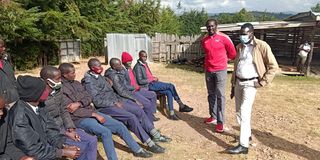Ethiopia in cruise control as Kenya yet to engage first gear in Olympic preparations

National Olympic Committee of Kenya President Paul Tergat and the athletes’ representative at the committee, Humphrey Khayange, talk to student athletes at the Kapsait Athletics Mixed Secondary School on January 18, 2021.
What you need to know:
- Performance at the Olympic Games are a yardstick with which to measure how successful a nation turns out in sports development.
- Certainly, holders of lead positions in the Kenyan sports set-up will largely be appraised through our performance at the Tokyo Games from July 23 to August 8.
- The ball is squarely on their court.
I must confess that procrastination is one of my weaknesses.
Involuntarily, I find myself, at times, pushing something that I can dispense with today to the back-burner for another day.
However, I thrive under pressure, able to turn things around under pressure cooker situations and deliver within deadline.
But I wouldn’t wish such traits on our national sports administrators as we prepare for the Tokyo Olympic Games.
Some matters require long-term planning and there’s no room for procrastination in preparations for the Olympic Games.
Last week, I spent a few days in Addis Ababa and what struck me as a warning shot is the fact that the Ethiopian Athletics Federation, in conjunction with the Ethiopian Olympic Committee, launched a residential training camp for the country’s Tokyo hopefuls last month.
The 60-plus athletes are resident in hotels – some of which are owned by athletes like Tirunesh Dibaba and Aselefech Mergia – in Addis, and have already launched round-the-clock training for Tokyo.
Last weekend, Ethiopia held their time trials for the distance races in the capital, kicking off the tough process of selection pretty early.
If this wouldn’t send shivers down the spines of Athletics Kenya selectors, then I don’t know what would jolt them into action.
The Tokyo Games are six months away and while many top athletics nations have already launched their preparations, we still await a progress report from “Team Kenya” officials across the Athletics Kenya (AK) and National Olympic Committee of Kenya (NOC-K) aisle.
Granted, NOC-K has done extremely well in launching scholarship programmes for Olympics-bound athletes and also visiting the various training camps and locations of the Olympic hopefuls.
AK have also mentioned early training camps for hopefuls in the 5,000 and 10,000 metres, with the men’s and women’s marathon teams already in place.
However, besides such morale-boosting shout outs and countless Zoom meetings, “Team Kenya” officials must launch immediate, bespoke and meticulous technical preparations to ensure Kenya bag the medals in Tokyo.
There has never been stiffer and more uncertain competition than what will be expected in Tokyo this July with the coronavirus pandemic having thrown the spanner in the works of most nations’ preparations for the Olympics.
As such, it’s extremely difficult to predict how athletes from other nations will perform as there’s no reliable form guide.
There has been talk of bubble training camps for Kenyan hopefuls. These must be set into motion immediately, and not remain the subject of virtual talk on Zoom platforms.
As it were, Kenya goes into the Olympics with the danger of a low gold medal count if pre-Games race-by-race analysis hold water.
Apart from the men’s and women’s marathons, where Kenya boasts world record holders in each division (Eliud Kipchoge, Brigid Kosgei), the men’s and women’s 1,500 metres (Timothy Cheruiyot, Faith Chepng’etich), women’s 5,000m (Hellen Obiri) and steeplechase (Beatrice Chepkoech), all the other races remain wide open and uncertain for Kenya.
Yes, including the men’s steeplechase where defending champion Conseslus Kipruto risks being derailed by unnecessary off-the-track issues that have lately soiled his erstwhile impeccable credentials.
Joshua Cheptegei (Uganda), Mo Farah (Great Britain) and Selemon Barega (Ethiopia) are already touted as possible occupants of podium positions in the 10,000m with Farah and Cheptegei considering doubling up with the 5,000m where Ethiopia will be ably represented by two-time world champion Muktar Edris.
However, with well-choreographed, early preparations, Kenya could strike from the underdog position and upset the applecart.
And not just in track and field, but also in men’s sevens rugby where a podium finish is a reality, given that “Shujaa” have previously won the Singapore leg of the World Sevens Series besides making the semi-final of the Rugby World Cup Sevens in 2009, falling 12-0 to losing finalists Argentina in the penultimate stage.
It is reassuring to see NOC-K President Paul Tergat, his AK counterpart Jackson Tuwei alongside “Team Kenya” general team manager Barnabas Korir and NOC-K secretary Francis Mutuku and athletes’ representative Humphrey Khayange visit the North Rift yesterday and today to motivate Tokyo-bound athletes, listen to their concerns and offer them motivation.
It was especially reassuring to see Tergat and team visit the far-flug Kapsait Nike Athletics Training Camp and Kapsait Athletics Mixed Secondary School yesterday, where Eric Kimaiyo - a former multiple Honolulu Marathon champion and then man behind the Kapsait - made a passionate appeal to Tergat and NOC-K to assist in the development of the camp that is home to women’s world marathon record holder Brigid Kosgei.
It behoves the government to also release funding for Olympic preparations early enough to avoid the same old issues that surround financing of Kenyan contingents to such major engagements.
With the coronavirus having reared its ugly head, the Tokyo Olympics will be quite different from the Games of old with meticulous planning requisite for good performances, besides steady cash flows to enable “Team Kenya” officials carry out their training and logistical programmes, unhindered.
Performance at the Olympic Games are a yardstick with which to measure how successful a nation turns out in sports development.
Certainly, holders of lead positions in the Kenyan sports set-up will largely be appraised through our performance at the Tokyo Games from July 23 to August 8.
The ball is squarely on their court.





